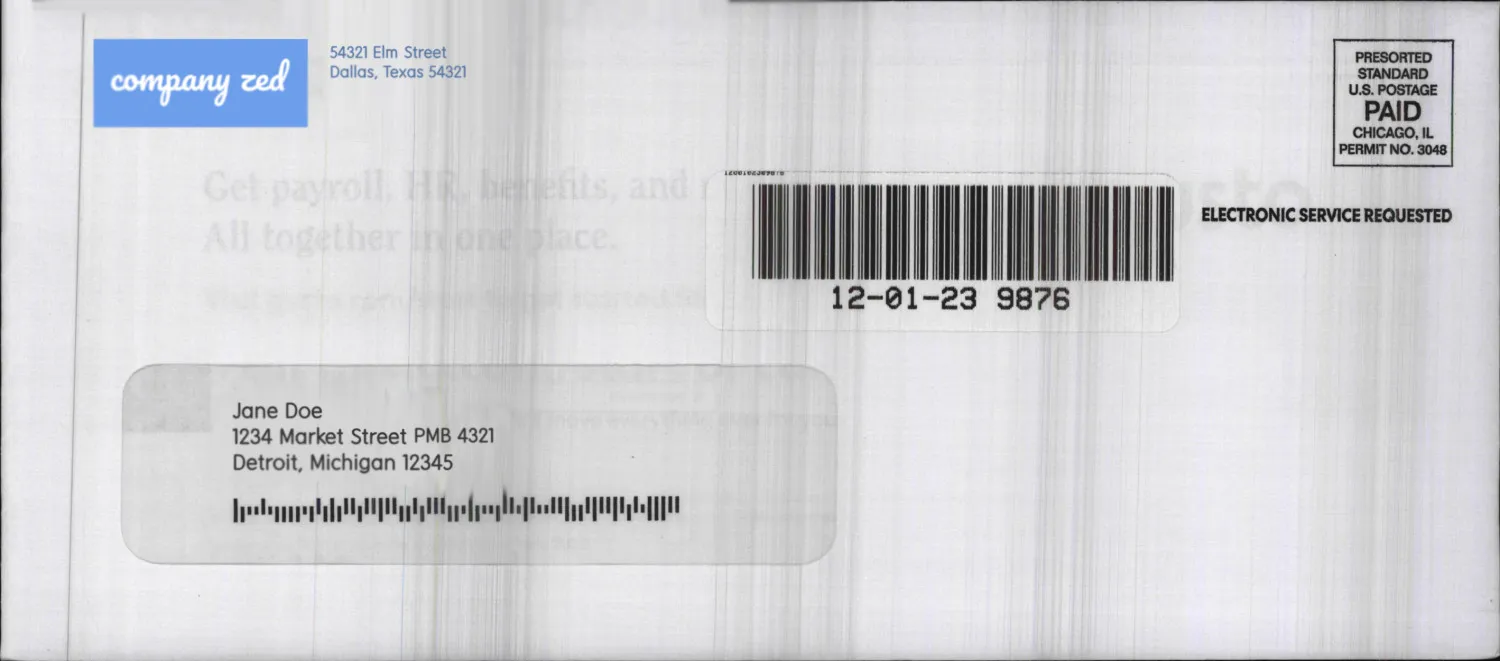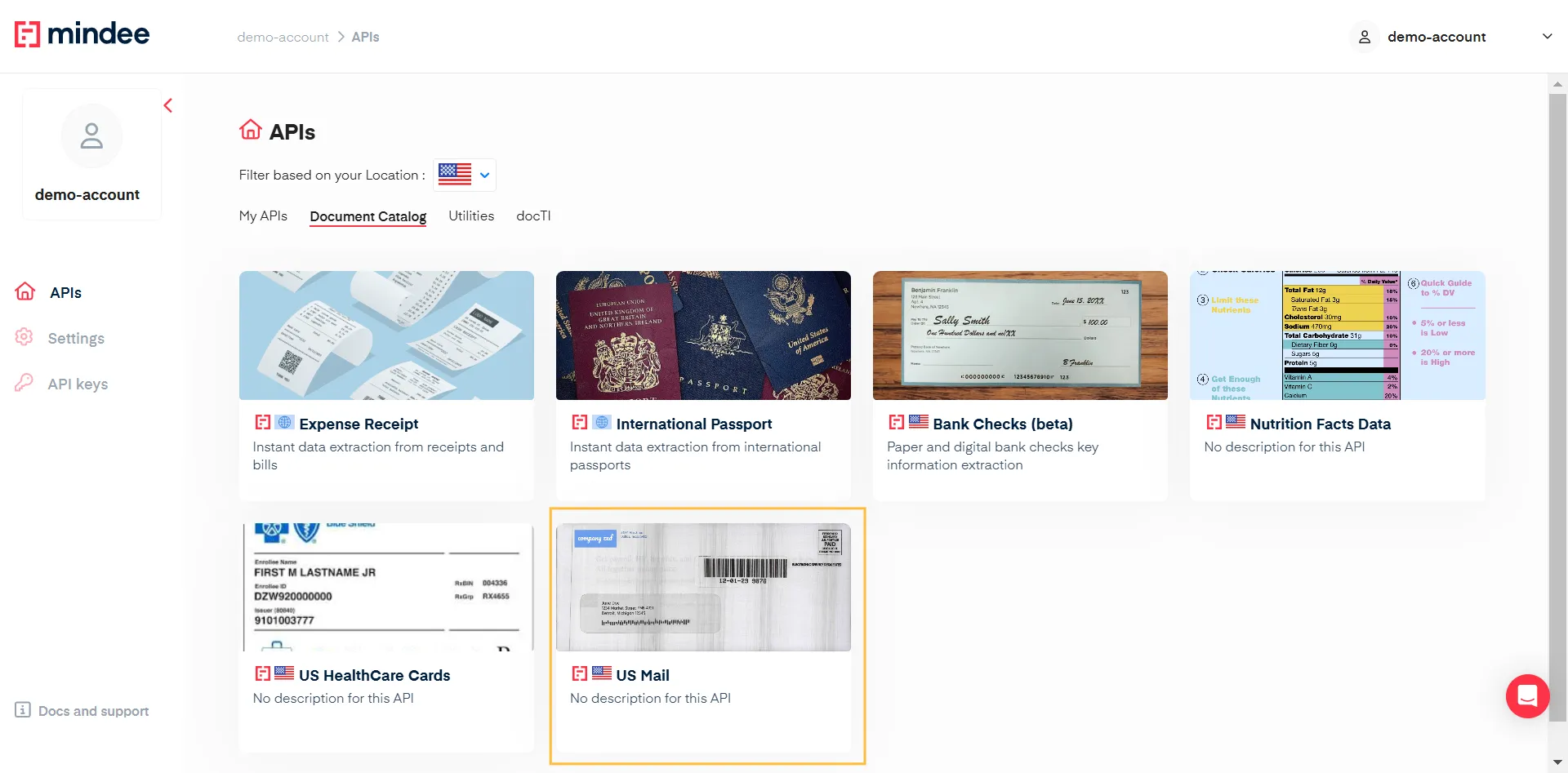US Mail OCR
Automatically extract data from US Mail.
Mindee’s US Mail OCR API uses deep learning to automatically, accurately, and instantaneously parse your documents details. In a few seconds, the API extracts a set of data from your PDFs or photos of US mails, including:
- Sender Name
- Sender Address
- Recipient Names
- Recipient Addresses
The US Mail OCR API supports documents from the US. The documents from other nationalities and states are not supported with this model.
Set up the API
Before making any API calls, you need to have created your API key.
- To test your API, you can use the sample document provided below.

- Access your US Mail OCR by clicking on the corresponding product card in the Document Catalog

- From the left navigation, go to documentation > API Reference, you'll find sample code in popular languages and command line.
from mindee import Client, product, AsyncPredictResponse
# Init a new client
mindee_client = Client(api_key="my-api-key-here")
# Load a file from disk
input_doc = mindee_client.source_from_path("/path/to/the/file.ext")
# Load a file from disk and enqueue it.
result: AsyncPredictResponse = mindee_client.enqueue_and_parse(
product.us.UsMailV2,
input_doc,
)
# Print a brief summary of the parsed data
print(result.document)
const mindee = require("mindee");
// for TS or modules:
// import * as mindee from "mindee";
// Init a new client
const mindeeClient = new mindee.Client({ apiKey: "my-api-key-here" });
// Load a file from disk
const inputSource = mindeeClient.docFromPath("/path/to/the/file.ext");
// Parse the file
const apiResponse = mindeeClient.enqueueAndParse(
mindee.product.us.UsMailV2,
inputSource
);
// Handle the response Promise
apiResponse.then((resp) => {
// print a string summary
console.log(resp.document.toString());
});
using Mindee;
using Mindee.Input;
using Mindee.Product.Us.UsMail;
string apiKey = "my-api-key-here";
string filePath = "/path/to/the/file.ext";
// Construct a new client
MindeeClient mindeeClient = new MindeeClient(apiKey);
// Load an input source as a path string
// Other input types can be used, as mentioned in the docs
var inputSource = new LocalInputSource(filePath);
// Call the product asynchronously with auto-polling
var response = await mindeeClient
.EnqueueAndParseAsync<UsMailV2>(inputSource);
// Print a summary of all the predictions
System.Console.WriteLine(response.Document.ToString());
// Print only the document-level predictions
// System.Console.WriteLine(response.Document.Inference.Prediction.ToString());
#
# Install the Ruby client library by running:
# gem install mindee
#
require 'mindee'
# Init a new client
mindee_client = Mindee::Client.new(api_key: 'my-api-key')
# Load a file from disk
input_source = mindee_client.source_from_path('/path/to/the/file.ext')
# Parse the file
result = mindee_client.parse(
input_source,
Mindee::Product::US::UsMail::UsMailV3
)
# Print a full summary of the parsed data in RST format
puts result.document
# Print the document-level parsed data
# puts result.document.inference.prediction
import com.mindee.MindeeClient;
import com.mindee.input.LocalInputSource;
import com.mindee.parsing.common.AsyncPredictResponse;
import com.mindee.product.us.usmail.UsMailV2;
import java.io.File;
import java.io.IOException;
public class SimpleMindeeClient {
public static void main(String[] args) throws IOException, InterruptedException {
String apiKey = "my-api-key-here";
String filePath = "/path/to/the/file.ext";
// Init a new client
MindeeClient mindeeClient = new MindeeClient(apiKey);
// Load a file from disk
LocalInputSource inputSource = new LocalInputSource(new File(filePath));
// Parse the file asynchronously
AsyncPredictResponse<UsMailV2> response = mindeeClient.enqueueAndParse(
UsMailV2.class,
inputSource
);
// Print a summary of the response
System.out.println(response.toString());
// Print a summary of the predictions
// System.out.println(response.getDocumentObj().toString());
// Print the document-level predictions
// System.out.println(response.getDocumentObj().getInference().getPrediction().toString());
// Print the page-level predictions
// response.getDocumentObj().getInference().getPages().forEach(
// page -> System.out.println(page.toString())
// );
}
}
API_KEY='my-api-key-here'
ACCOUNT='mindee'
ENDPOINT='us_mail'
VERSION='2'
FILE_PATH='/path/to/your/file.png'
# Maximum amount of retries to get the result of a queue
MAX_RETRIES=10
# Delay between requests
DELAY=6
# Enqueue the document for async parsing
QUEUE_RESULT=$(curl -sS --request POST \
-H "Authorization: Token $API_KEY" \
-H "Content-Type: multipart/form-data" \
-F "document=@$FILE_PATH" \
"https://api.mindee.net/v1/products/$ACCOUNT/$ENDPOINT/v$VERSION/predict_async")
# Status code sent back from the server
STATUS_CODE=$(echo "$QUEUE_RESULT" | grep -oP "[\"|']status_code[\"|']:[\s][\"|']*[a-zA-Z0-9-]*" | rev | cut --complement -f2- -d" " | rev)
# Check that the document was properly queued
if [ -z "$STATUS_CODE" ] || [ "$STATUS_CODE" -gt 399 ] || [ "$STATUS_CODE" -lt 200 ]
then
if [ -z "$STATUS_CODE" ]
then
echo "Request couldn't be processed."
exit 1
fi
echo "Error $STATUS_CODE was returned by API during enqueuing. "
# Print the additional details, if there are any:
ERROR=$(echo "$QUEUE_RESULT" | grep -oP "[\"|']error[\"|']:[\s]\{[^\}]*" | rev | cut --complement -f2- -d"{" | rev)
if [ -z "$ERROR" ]
then
exit 1
fi
# Details on the potential error:
ERROR_CODE=$(echo "$ERROR" | grep -oP "[\"|']code[\"|']:[\s]\"[^(\"|\')]*" | rev | cut --complement -f2- -d"\"" | rev)
MESSAGE=$(echo "$QUEUE_RESULT" | grep -oP "[\"|']message[\"|']:[\s]\"[^(\"|\')]*" | rev | cut --complement -f2- -d"\"" | rev)
DETAILS=$(echo "$QUEUE_RESULT" | grep -oP "[\"|']details[\"|']:[\s]\"[^(\"|\')]*" | rev | cut --complement -f2- -d"\"" | rev)
echo "This was the given explanation:"
echo "-------------------------"
echo "Error Code: $ERROR_CODE"
echo "Message: $MESSAGE"
echo "Details: $DETAILS"
echo "-------------------------"
exit 1
else
echo "File sent, starting to retrieve from server..."
# Get the document's queue ID
QUEUE_ID=$(echo "$QUEUE_RESULT" | grep -oP "[\"|']id[\"|']:[\s][\"|'][a-zA-Z0-9-]*" | rev | cut --complement -f2- -d"\"" | rev)
# Amount of attempts to retrieve the parsed document were made
TIMES_TRIED=1
# Try to fetch the file until we get it, or until we hit the maximum amount of retries
while [ "$TIMES_TRIED" -lt "$MAX_RETRIES" ]
do
# Wait for a bit at each step
sleep $DELAY
# Note: we use -L here because the location of the file might be behind a redirection
PARSED_RESULT=$(curl -sS -L \
-H "Authorization: Token $API_KEY" \
"https://api.mindee.net/v1/products/$ACCOUNT/$ENDPOINT/v$VERSION/documents/queue/$QUEUE_ID")
# Isolating the job (queue) & the status to monitor the document
JOB=$(echo "$PARSED_RESULT" | grep -ioP "[\"|']job[\"|']:[\s]\{[^\}]*" | rev | cut --complement -f2- -d"{" | rev)
QUEUE_STATUS=$(echo "$JOB" | grep -ioP "[\"|']status[\"|']:[\s][\"|'][a-zA-Z0-9-]*" | rev | cut --complement -f2- -d"\"" | rev)
if [ "$QUEUE_STATUS" = "completed" ]
then
# Print the result
echo "$PARSED_RESULT"
# Optional: isolate the document:
# DOCUMENT=$(echo "$PARSED_RESULT" | grep -ioP "[\"|']document[\"|']:[\s].*([\"|']job[\"|'])" | rev | cut -f2- -d"," | rev)
# echo "{$DOCUMENT}"
# Remark: on compatible shells, fields can also be extracted through the use of tools like jq:
# DOCUMENT=$(echo "$PARSED_RESULT" | jq '.["document"]')
exit 0
fi
TIMES_TRIED=$((TIMES_TRIED+1))
done
fi
echo "Operation aborted, document not retrieved after $TIMES_TRIED tries"
exit 1
<?php
use Mindee\Client;
use Mindee\Product\Us\UsMail\UsMailV2;
// Init a new client
$mindeeClient = new Client("my-api-key-here");
// Load a file from disk
$inputSource = $mindeeClient->sourceFromPath("/path/to/the/file.ext");
// Parse the file asynchronously
$apiResponse = $mindeeClient->enqueueAndParse(UsMailV2::class, $inputSource);
echo $apiResponse->document;
- Replace my-api-key-here with your new API key, or use the "select an API key" feature and it will be filled automatically.
- Copy and paste the sample code of your desired choice in your application, code environment or terminal.
- Replace
/path/to/my/filewith the path to your document.
Always remember to replace your API key!
- Run your code. You will receive a JSON response with your document details.
API Response
Here is the full JSON response you get when you call the API:
{
"api_request": {
"error": {},
"resources": [
"document",
"job"
],
"status": "success",
"status_code": 200,
"url": "https://api.mindee.net/v1/products/mindee/us_mail/v2/documents/eb4c9ccc-a20c-46de-9f75-fd6fdc5115ec"
},
"document": {
"id": "eb4c9ccc-a20c-46de-9f75-fd6fdc5115ec",
"inference": {
"extras": {},
"finished_at": "2024-10-30T14:54:19.789000",
"is_rotation_applied": true,
"pages": [
{
"extras": {},
"id": 0,
"orientation": {
"value": 0
},
"prediction": {}
}
],
"prediction": {
"recipient_addresses": [
{
"city": "Detroit",
"complete": "1234 Market Street PMB 4321, Detroit, Michigan 12345",
"is_address_change": false,
"postal_code": "12345",
"private_mailbox_number": "4321",
"state": "MI",
"street": "1234 Market Street"
}
],
"recipient_names": [
{
"value": "Jane Doe"
}
],
"sender_address": {
"city": "Dallas",
"complete": "54321 Elm Street, Dallas, Texas 54321",
"postal_code": "54321",
"state": "TX",
"street": "54321 Elm Street"
},
"sender_name": {
"value": "zed"
}
},
"processing_time": 3.072,
"product": {
"features": [
"sender_name",
"sender_address",
"recipient_names",
"recipient_addresses"
],
"name": "mindee/us_mail",
"type": "standard",
"version": "2.0"
},
"started_at": "2024-10-30T14:54:16.506000"
},
"n_pages": 1,
"name": "US-mail-sample.jpg"
},
"job": {
"available_at": "2024-10-30T14:54:19.799000",
"error": {},
"id": "02e29373-20fe-4a92-8245-7edc9d4ca8e5",
"issued_at": "2024-10-30T14:54:16.506000",
"status": "completed"
}
}
You can find the prediction within the prediction key found in document > inference > prediction for document-level predictions: it contains the different fields extracted at the document level, meaning that for multi-pages PDFs, we reconstruct a single object using all the pages.
Extracted data
Using the above document example the following are the basic fields that can be extracted.
Sender Name
- sender_name: The name of the sender.
{
"sender_name": {
"value": "zed"
}
}
Sender Address
- sender_address: The address of the sender.
- complete: The complete address of the sender.
- street: The street of the sender's address.
- city: The city of the sender's address.
- state: Second part of the ISO 3166-2 code, consisting of two letters indicating the US State.
- postal_code: The postal code of the sender's address.
{
"sender_address": {
"city": "Dallas",
"complete": "54321 Elm Street, Dallas, Texas 54321",
"postal_code": "54321",
"state": "TX",
"street": "54321 Elm Street"
}
}
Recipient Names
- recipient_names: The names of the recipients.
{
"recipient_names": [
{
"value": "Jane Doe"
}
]
}
Recipient Addresses
- recipient_address: The address of the recipients.
- complete: The complete address of the recipient.
- street: The street of the recipient’s address.
- city: The city of the recipient’s address.
- state: Second part of the ISO 3166-2 code, consisting of two letters indicating the US State.
- postal_code: The postal code of the recipient’s address.
{
"recipient_addresses": [
{
"city": "Detroit",
"complete": "1234 Market Street PMB 4321, Detroit, Michigan 12345",
"is_address_change": false,
"postal_code": "12345",
"private_mailbox_number": "4321",
"state": "MI",
"street": "1234 Market Street"
}
]
}
Updated 13 days ago
